
Electronic Journal of Information Systems in Developing Countries
Scope & Guideline
Pioneering Solutions for Tomorrow's Information Challenges
Introduction
Aims and Scopes
- Information and Communication Technology (ICT) for Development:
The journal emphasizes the role of ICT in fostering development, particularly in addressing issues such as poverty alleviation, education, and healthcare access in developing countries. - E-Government and Public Sector Innovation:
Research focuses on the implementation and effectiveness of e-government initiatives aimed at improving public service delivery and citizen engagement in resource-constrained environments. - Digital Transformation and Business Innovation:
The journal explores how digital technologies can transform businesses in developing countries, including the adoption of mobile banking, e-commerce, and digital strategies to enhance competitiveness. - Social Impact of Information Systems:
A significant focus is placed on understanding the social implications of information systems, especially in terms of empowerment, community engagement, and social capital development. - Sustainable Development and Environmental Considerations:
The journal highlights research that integrates information systems with sustainable development goals, addressing challenges such as climate change, resource management, and social equity. - Methodological Approaches to ICT Research:
EJISDC values diverse research methodologies, including qualitative, quantitative, and mixed-methods approaches, to comprehensively address the complexities of information systems in developing contexts.
Trending and Emerging
- Health Information Systems and Digital Health:
An increasing number of studies focus on the implementation and impact of health information systems, particularly in managing public health crises such as COVID-19, emphasizing the importance of digital health technologies. - Impact of Artificial Intelligence and Big Data:
Research exploring the role of AI and big data analytics in decision-making processes, particularly in sectors such as finance, agriculture, and public services, is gaining traction. - Community-Driven and Participatory Approaches:
There is a growing emphasis on community-driven initiatives and participatory approaches in the design and implementation of information systems, aiming to enhance local engagement and ownership. - Sustainability and Green ICT:
Emerging themes focus on the intersection of ICT and sustainability, investigating how technology can support environmental goals and sustainable practices in developing regions. - Digital Inclusion and Equity:
Research on bridging the digital divide and promoting equitable access to information technologies, particularly for marginalized communities, is increasingly prominent. - Gender and ICT Development:
Studies examining the role of gender in ICT access and usage, especially in empowering women and addressing gender disparities in technology adoption, are becoming more prevalent.
Declining or Waning
- Traditional ICT Adoption Studies:
Research focusing solely on the adoption of ICT without considering contextual factors or broader socio-economic impacts has diminished, as scholars now emphasize the need for more integrated and contextualized approaches. - Purely Technological Solutions:
There is a waning interest in studies that propose technological solutions in isolation, without addressing the socio-cultural, political, and economic contexts that influence technology use and effectiveness. - Generalized E-Government Frameworks:
The journal has moved away from generic frameworks for e-government implementation, favoring more nuanced analyses that consider local conditions, stakeholder engagement, and specific implementation challenges. - Cybersecurity as a Standalone Topic:
While cybersecurity remains important, papers focusing exclusively on cybersecurity issues without integrating them into broader information systems discussions are less frequently published. - Single-Country Case Studies:
There has been a notable decline in the publication of single-country case studies, with an increasing preference for comparative studies that draw insights from multiple contexts.
Similar Journals
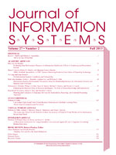
JOURNAL OF INFORMATION SYSTEMS
Connecting Theory and Practice in Information SystemsJOURNAL OF INFORMATION SYSTEMS is a prestigious academic journal published by the American Accounting Association, dedicated to advancing the field of information systems within the context of accounting and management. With an ISSN of 0888-7985 and an E-ISSN of 1558-7959, this journal has been a vital resource since its inception, now converging from 2009 to 2024. It boasts an impressive impact in several relevant categories, achieving Q2 status in fields such as Accounting, Information Systems, and Management Information Systems, showcasing its influence among peers. Moreover, it maintains a commendable ranking in various Scopus categories, including a rank of #69 in Accounting and #55 in Management Information Systems, placing it in the 61st and 58th percentile, respectively. Although it is not an open-access journal, the JOURNAL OF INFORMATION SYSTEMS remains an essential platform for researchers, professionals, and students aiming to explore case studies, theoretical insights, and practical applications in the dynamic field of information systems and technology management.
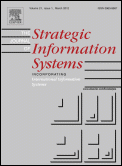
JOURNAL OF STRATEGIC INFORMATION SYSTEMS
Advancing Knowledge at the Intersection of Strategy and TechnologyJOURNAL OF STRATEGIC INFORMATION SYSTEMS, published by Elsevier, is a premier journal dedicated to the field of Information Systems, focusing on the intersection of strategic management and information technology. Established in 1991, this journal serves as a vital platform for presenting cutting-edge research and innovative practices that advance the understanding and application of information systems within organizations. With an impressive Q1 categorization in areas such as Information Systems, Management Information Systems, and Information Systems and Management for 2023, it firmly positions itself among the top journals in its field, boasting high visibility and a rigorous peer-review process. Its Scopus rankings are equally outstanding, with a 95th percentile rank in several relevant categories, indicating its influence and contribution to research and practice. Scholars and practitioners alike are encouraged to access this journal for its wealth of knowledge, insights, and case studies designed to bridge theory and practice in strategic information systems. At RADARWEG 29, 1043 NX AMSTERDAM, NETHERLANDS, this journal continues to foster critical dialogues and research that shape the future of information systems in the global business landscape.
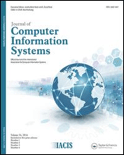
JOURNAL OF COMPUTER INFORMATION SYSTEMS
Connecting Research and Innovation in TechnologyThe JOURNAL OF COMPUTER INFORMATION SYSTEMS, published by Taylor & Francis Inc, is a prestigious academic journal dedicated to the fields of computer science and information systems. With an ISSN of 0887-4417 and an E-ISSN of 2380-2057, this journal has been a valuable resource since its inception in 1995, contributing to the convergence of research until 2024. The journal holds significant status in its respective categories, achieving a Q2 ranking in Computer Networks and Communications, and a Q1 ranking in Education, demonstrating its impact and relevance to a broad academic audience. With Scopus rankings placing it in the 90th percentile for Social Sciences - Education and respectable standings in Computer Science, it serves as a critical forum for the dissemination of innovative research, methodologies, and case studies within the domains of computer information systems. Although not an open-access journal, it remains a highly cited source, attracting researchers, educators, and professionals seeking to enhance their knowledge and contribute to the evolving discourse in technology and education.

Journal of African Business
Fostering Dialogue on Africa's Business Challenges and OpportunitiesJournal of African Business, published by Routledge Journals, Taylor & Francis Ltd, is a premier academic journal dedicated to the intricate dynamics of business and economic development across the African continent. Since its inception in 2000, the journal has established itself as a vital resource for researchers, practitioners, and policymakers by providing insightful analyses and cutting-edge research that address contemporary challenges faced by African economies. With an impressive ranking of Q2 in both Development and Geography, Planning and Development, this journal is positioned among the top-tier publications in its field, further evidenced by its Scopus rankings—66th out of 306 in Social Sciences Development and 192nd out of 821 in Geography. While currently not open access, it offers invaluable content that is crucial for understanding the intricate links between business practices and socio-economic growth in Africa. The Journal of African Business remains an essential platform for innovative dialogues and knowledge dissemination, making it a must-read for stakeholders engaged in African business research and development.
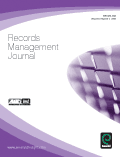
Records Management Journal
Illuminating Trends in Library and Information Sciences.Records Management Journal, published by Emerald Group Publishing Ltd, is a leading academic journal in the fields of Library and Information Sciences and Management Information Systems. With an ISSN of 0956-5698 and an E-ISSN of 1758-7689, the journal has established itself as a vital resource for researchers, practitioners, and students interested in emerging trends, best practices, and the evolution of records management since its inception in 1989. Positioned within the Q2 and Q3 quartiles for 2023, it is ranked #70/280 in Library and Information Sciences and #58/131 in Management Information Systems, underscoring its influential role within academia. The journal is characterized by a rigorous peer-review process, ensuring high-quality articles that contribute significantly to the profession and scholarly discourse. While it is not an open-access publication, its subscription-based model ensures access to comprehensive research that aids in the development of effective records management strategies across various sectors. The Records Management Journal remains a pivotal platform for knowledge exchange, fostering innovation and best practices in the management of information resources.

Romanian Journal of Information Technology and Automatic Control-Revista Romana de Informatica si Automatica
Advancing Knowledge in IT and AutomationThe Romanian Journal of Information Technology and Automatic Control (Revista Romana de Informatica si Automatica), published by the National Institute for Research and Development in Informatics (ICI), serves as a vital platform for the dissemination of research and developments in the fields of information technology and automation. With its Open Access policy since 2011, this journal ensures that innovative research is readily available to the global academic community, promoting knowledge sharing and collaboration. Based in Bucharest, Romania, the journal is well-positioned to contribute to both local and international discussions surrounding technological advancements, fostering a rich exchange of ideas among researchers, professionals, and students. The journal features original research articles, review papers, and case studies catering to both theoretical and practical aspects of the discipline, thus reinforcing its commitment to addressing contemporary challenges in information technology and automation.

EDUCATION FOR INFORMATION
Exploring New Frontiers in Educational ResearchEDUCATION FOR INFORMATION is an esteemed journal published by IOS PRESS, dedicated to advancing the fields of education, information systems, and library and information sciences. Established in 1983 and continuing through 2024, this scholarly publication provides a platform for innovative research and insightful discussions that cater to the evolving needs of these disciplines. The journal is recognized for its significant contributions to the academic community, holding a Q3 quartile ranking across several categories as of 2023, including Education and Information Systems. Although not an Open Access journal, EDUCATION FOR INFORMATION is indexed in Scopus, boasting a respectable ranking that positions it among the competitive tier of journals in its field. Researchers, practitioners, and students alike will find relevant articles that bridge theoretical foundations with practical applications, addressing contemporary challenges and trends in education and information science. With an international focus and a commitment to enriching the discourse in these vital areas, the journal remains a crucial resource for academia and industry professionals alike.
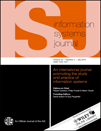
INFORMATION SYSTEMS JOURNAL
Exploring the Intersection of Theory and Practice in Information SystemsINFORMATION SYSTEMS JOURNAL, published by Wiley, is a prestigious academic journal dedicated to advancing the field of information systems, encompassing key areas such as computer networks, communication technologies, and software engineering. With an impressive track record of more than three decades, since its inception in 1991, the journal has secured a prominent position reflected in its Q1 rankings across multiple categories in 2023, placing it among the top-tier journals in Computer Networks and Communications, Information Systems, and Software. It boasts outstanding Scopus ranks, with percentiles in the 90s, positioning it as a vital source of cutting-edge research for professionals, academics, and students aiming to enhance their knowledge and contribute to the evolving landscape of information technology. Although it does not currently offer open access, the journal welcomes contributions that bridge theoretical insights with practical applications, fostering a dialogue among researchers and practitioners in the fast-paced world of information systems.

Journal of Professional Capital and Community
Shaping the future of education through rigorous scholarship.The Journal of Professional Capital and Community, published by Emerald Group Publishing Ltd, is a prestigious academic journal dedicated to advancing the understanding of professional capital within educational and community contexts. With an impressive track record, the journal is ranked Q1 in the categories of Communication, Education, and Social Psychology as of 2023, attesting to its prominence in these fields. It ranks remarkably high within Scopus, holding the 55th position out of 1543 in Social Sciences - Education, and the 15th position out of 310 in Psychology - Social Psychology, placing it in the top 4% and 5% of these categories, respectively. Since its inception in 2016, the journal has aimed to facilitate robust dialogue and foster innovative research that influences educational practices and professional development. Although it does not currently offer open access, the journal remains an essential resource for researchers, educators, and policy-makers seeking to bridge theory and practice in professional communities. For scholars looking to publish their findings, the journal provides a platform for impactful studies that shape contemporary discussions in education, communication, and social psychology.
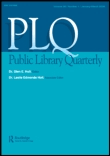
Public Library Quarterly
Exploring the future of community engagement in libraries.Public Library Quarterly, published by Routledge Journals, Taylor & Francis Ltd, is a premier scholarly journal dedicated to advancing the field of Library and Information Sciences. With an impressive impact factor and a distinguished ranking of Q1 in its category for 2023, this journal serves as a vital resource for both researchers and practitioners. Since its inception in 1979, it has explored the evolving role of public libraries in society, integrating contemporary research with practical insights. The journal is indexed in Scopus, ranking #69 out of 280 in the Library and Information Sciences category, placing it in the 75th percentile among its peers. Although it is not Open Access, the journal offers a wealth of knowledge on essential topics such as library management, community engagement, and information access, making it an indispensable tool for students, professionals, and scholars alike. Join a global community seeking to enhance public library services and contribute to the discourse on information accessibility and literacy in today's fast-changing landscape.